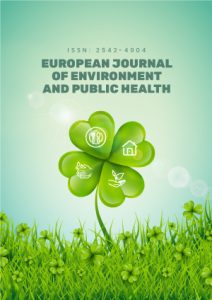Last September, a researcher at a university in Bangladesh emailed a journal about a paper he had published in 2019. He made a stark admission: the paper contained plagiarism, said Sorif Hossain, a lecturer in statistics at Noakhali Science and Technology University, who called for the article to be promptly retracted.
But the paper remained in place. Only after Retraction Watch contacted the European Journal of Environment and Public Health (EJEPH) last week did it issue a retraction.
The retraction notice states that the article, “Salinity and Miscarriage: Is There a Link? Impact of Climate Change in Coastal Areas of Bangladesh – A Systematic Review,” was “retracted due to plagiarism, analysis errors, and writing issues.” The paper has been cited six times, according to Google Scholar (the journal is not indexed in Clarivate’s Web of Science).
Modestum, EJEPH’s publisher, told Retraction Watch that, following an extended exchange with Hossain, a retraction note was “uploaded to the journal publication system, but final confirmation from the author was not well received and it stayed invisible.”
The publisher also promised to “investigate this issue further and [to] take necessary measures against those involved.”
Retraction Watch became aware of the case earlier this month when Amir Abdoli, an associate professor of medical parasitology at Jahrom University of Medical Sciences in Iran, contacted us about the EJEPH article. Abdoli pointed out that it includedd a figure from a 2016 publication of his, “Salt and miscarriage: Is there a link?,” in the journal Medical Hypotheses, without permission or even citation.
An analysis using the online comparison tool Copyscape revealed that in addition to the duplication of a figure from Abdoli’s paper, the majority of the 2019 article’s abstract closely resembles the abstract of Abdoli’s article in both phrasing and structure, with nearly 45% of the text of Abdoli’s abstract exactly duplicated.
Mustafa Younis, EJEPH’s editor-in-chief, told Retraction Watch that the publisher screens all articles with anti-plagiarism software before they reach him. He referred us to Modestum for further comment.
However, Hossain said that he had repeatedly contacted Modestum, Younis, and Veritas Publications, the journal’s previous publisher, to request that the journal remove or retract the article. He sent the first of these requests to Veritas in January 2021, writing, “I don’t want to retract the paper but want to remove this paper from this site.”
The publisher explained that the “only option we have is to publish a retraction notice for the article in the upcoming issue.” In a March 2021 email that Retraction Watch has seen, Hossain replied: “I am agreed to proceed with the retraction procedure and hope to get the update as soon as possible.”
What happened after the exchange, if anything, is unclear. From the correspondence shared with Retraction Watch, it does not appear that the editor or publisher made any inquiries about the reasons Hossain wanted his paper retracted.
However, in a September 2022 email to Younis and Modestum, Hossain admitted that his paper contained plagiarism and asked for it to be withdrawn or retracted:
My goal is to remove this paper. It has some plagiarism, analysis error, and writing issues. That is why I want to withdraw my paper.
Modestrum acknowledged that Hossain had contacted them and Veritas several times about withdrawing or retracting the article:
The author repeatedly asked that the article should be “removed” from the website, and not retracted. We see that, in several occasions, the author agreed with the retraction, and later “changed his plan” and “decided to not retract”. These communications with the earlier publisher took place from January 2021 to March 2021.
Then, during the publisher change, we started receiving another set of “removal” requests from this author. We explained that the article cannot simply be “withdrawn” or “removed” from the journal, and explained the retraction procedure. The retraction note was prepared, it was uploaded to the journal publication system, but final confirmation from the author was not well received and it stayed invisible.
Though the retraction notice originally stated that it was published in January 2023 and available online since September 2022, the date was later changed to June 2023. The text of the retraction notice was also changed to offer an explanation for the retraction.
Emails forwarded to Retraction Watch by Hossain show that while he did ask for his article to be “removed” and not “retracted,” he sometimes used the terms interchangeably.
According to Hossain, he wanted the article retracted because of the duplication of the figure and close paraphrase of the abstract of Abdoli’s 2016 article. At the time of writing the article, his first as an undergraduate student at the University of Dhaka in Bangladesh, he said he did not understand how to properly cite and incorporate images and sources, nor the seriousness of his offense.
“However, when I knew that it [was] a big problem,” he said, “then I contacted the journal to retract this article.”
In a September email Hossain said was his last to the publisher until this month, he wrote:
I have discussed this with my supervisor and decided to withdraw my paper.
Kindly take the necessary actions regarding this matter and publish this retraction notice in the current issue.
In response, Hossain said the publisher responded that they would publish the retraction in the January 2023 issue of the journal. The fact that they did not, he told Retraction Watch, “is really unacceptable.”
Like Retraction Watch? You can make a tax-deductible contribution to support our work, follow us on Twitter, like us on Facebook, add us to your RSS reader, or subscribe to our daily digest. If you find a retraction that’s not in our database, you can let us know here. For comments or feedback, email us at [email protected].
